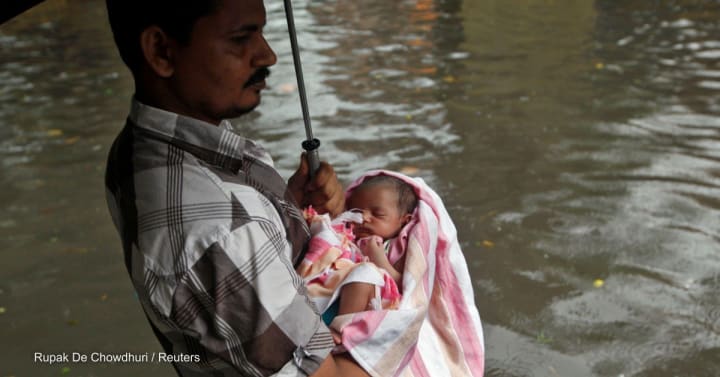
It’s only 11 o’clock in the morning in Mwingitsa village, in the Neno district in southern Malawi, but the weather has already reached 47 degrees Celsius.
Sign up for Devex CheckUp
The must-read weekly newsletter for exclusive global health news and insider insights.
“The temperatures have never been this high,” observes Florence Phiri, a 25-year-old mother-of-two.
As a single mother, Phiri — whose name has been changed to maintain her privacy — has the sole responsibility of running her household. Her day begins as early as four in the morning when she has to fetch water. After fetching water she collects firewood, then goes around the village looking for menial jobs so that she can get money to buy food for her children.
But she said the extreme heat that the country has been experiencing over the last two years has meant that she now needs to travel to a borehole at Moffat village, which is around 4 kilometers (2.49 miles) from where she stays. Temperatures in Malawi have increased at an average rate of 0.21 degrees Celsius per decade. There have been no good rains, she said.
Phiri said she used to attend family planning consultations at Lisungwi Community Hospital, however, this year she has skipped her visits because of the long walks she endures to collect water and she is now expecting her third child.
According to MSI Reproductive Choices, there is a direct link between access to sexual reproductive health services and climate change. The organization found that, since 2011, 11.5 million women in the 26 countries where it operates have had their access to contraceptives disrupted due to climate change. MSI warned that if nothing is done this number will rise to 14 million over the next decade and called on governments and donors to integrate sexual and reproductive health care and rights into the funding commitments made at COP 26.
“Today, 218 million women and girls want access to contraception but can’t get it. Many of these women are now also facing the immediate effects of the climate crisis, with Africa the most vulnerable continent despite only contributing 2% of the world's carbon dioxide emissions,” MSI said in a statement. Warning that failure to address access could result in an additional 6.2 million unintended pregnancies and 5,800 maternal deaths.
“Contraception transforms and saves lives, if access to contraception is not protected, we will see more unplanned pregnancies, more unsafe abortions, fewer girls able to complete their education and fewer women supported to pursue a career or engage economically or politically in their communities,” said Simeon Thodi, policy and advocacy lead at MSI Malawi and works at MSI’s Malawi project Banja La Mtsogolo.
Extreme weather will continue to create environmentally displaced persons and new humanitarian crises, according to the International Center for Research on Women. But emergency response teams are largely underequipped to deal with the interruptions to SRH services, which can lead to increases in early child and forced marriage; unwanted sex work; and gender-based violence.
Phiri told Devex she has been engaging in transactional sex because she cannot afford to buy food for her two children. Donald Makwakwa, executive director at the Family Planning Association of Malawi, said this has become a common occurrence in Malawi adding that the effects of climate change have also increased women's vulnerability to unplanned pregnancies as they fail to discuss safe sex due to power imbalances caused by climate-induced poverty.
“It only costs 2 pence a day for MSI to protect a young woman from unintended pregnancy for one year, enabling her to adapt and take part in finding the solutions.”
— Sanou Gning, Sahel director, MSIMalawi is considered one of the most climate-vulnerable countries in the world — ranking at 163 out of 181 in the ND-Global Adaptation Initiative Index — which ranks the climate adaptation performance.
Francis Nkoka, senior disaster risk management specialist with the World Bank in Malawi, said droughts and floods are estimated to cost the country on average around 1.7% of its gross domestic product annually.
“Projected changes in future climate, with increasing climatic variability, higher temperatures, more extended dry periods, and more erratic and intense rainfall events, will make it harder for Malawi to achieve its 2030 development agenda goals,” he said.
Barbra Banda, a Malawian gender activist, said these effects of climate change are crosscutting and should also be dealt with through a gender lens as women in the country are suffering.
ICRW called on the United States government — as one of the biggest contributors of climate emissions and the largest family planning donor — to gender mainstream all climate financing, to target gender equality in 20% of climate financing, and to ensure that data on gender equality impacts of climate change — including SRHR — are collected.
MSI along with 65 partners called on governments and donors to integrate sexual and reproductive health care and rights into funding commitments made at COP 26 by paying attention to the interlinkages between global warming and SRHR which comprises issues such as access to contraceptives, maternal and newborn birth, and gender-based violence.
“It only costs 2 pence a day for MSI to protect a young woman from unintended pregnancy for one year, enabling her to adapt and take part in finding the solutions,” said Sanou Gning, Sahel director at MSI. “We are calling for climate funding to include sexual and reproductive health and rights to support those on the frontline of the climate crisis to determine their lives and futures.”





